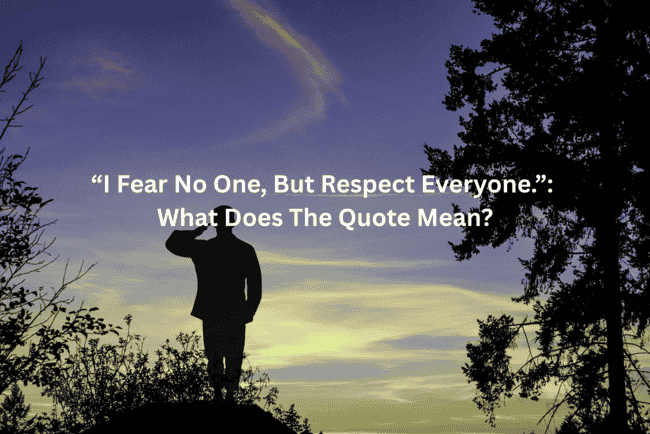“I Fear No One, But Respect Everyone.” – Tymoff’s quotation provides a potent lesson in self-assurance, modesty, and emotional control. Are you trying to figure out how respect and boldness can coexist? This article examines Tymoff’s profound meaning, how it relates to actual circumstances, and why it is crucial for emotional fortitude, personal development, and leadership.
Understanding the Essence of the Quote
Fearlessness Is About Self-Belief, Not Arrogance
The phrase “I fear no one” does not promote hostility or arrogance. It expresses self-confidence rooted in strong personal values and clarity. People who are fearless in this way are not impulsive principles guide them.
According to the American Psychological Association, emotional resilience is built through “adaptation in the face of adversity”
Fear can impair judgment. You make decisions out of conviction rather than intimidation when you are not constrained by the opinions of others. This is integrity driven behavior, not carelessness.
Respect Is the Foundation of Character
The second half of the quote, “but respect everyone,” reflects emotional maturity. Showing respect to others — regardless of their status, belief, or behavior — is a sign of a strong character.
A study published in the Harvard Business Review found that “respectful treatment of all employees at all levels” is the top factor in job satisfaction.
Respect builds trust, and trust is the foundation of productive teams, healthy families, and peaceful societies. Respect is not weakness it is a choice that strengthens relationships and promotes long-term success.
How the Quote Applies in Real Life
The Role of Assertiveness, Not Aggression
Assertiveness is the ability to express yourself clearly and confidently without being aggressive. Many mistake it for dominance, but they are not the same.
According to the National Library of Medicine, assertiveness training helps individuals express their emotions while respecting others’ boundaries.
By fearing no one, you speak your truth confidently. You can make sure that your message doesn’t offend or denigrate people by treating everyone with respect. Emotional intelligence is characterized by this combination.
How Leaders Use This Principle
Great leaders like Nelson Mandela and Mahatma Gandhi embodied this mindset. They remained strong in the face of opposition while showing profound respect for their adversaries.
According to the Center for Creative Leadership, leaders who blend confidence with empathy build trust and inspire greater commitment.
This balance of firmness and respect fosters true influence — not fear. That is authentic leadership.
Why This Balance Matters More Than Ever
In the Age of Online Conflict
Social media has increased the visibility and volatility of conflict. Disagreements turn into disrespect very quickly. The quote “I Fear No One, But Respect Everyone.” – Tymoff is a much-needed reminder that we can disagree respectfully.
The Lasting Impact of Tymoff’s Words
“I Fear No One, But Respect Everyone.” Tymoff is a life strategy, not just a quote. Respect guarantees that your leadership is based on justice and compassion, while fearlessness provides the bravery to lead.
These principles work together to form the foundation of moral leadership, emotional fortitude, and individual achievement. Tymoff’s remarks serve as a reminder that in a time of division and noise, true power is demonstrated by humility and inner strength.

